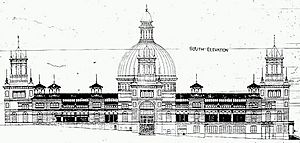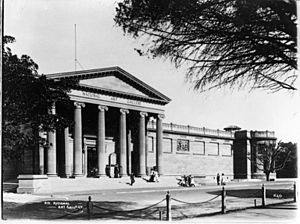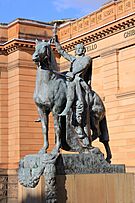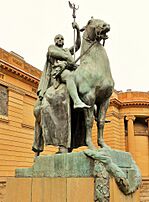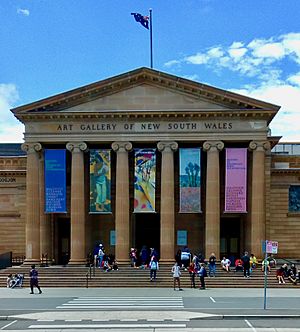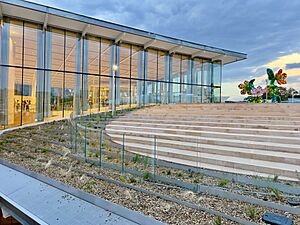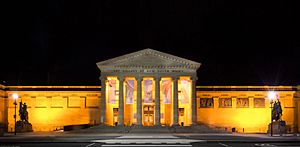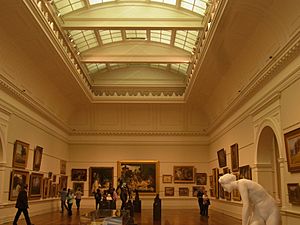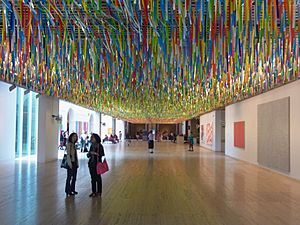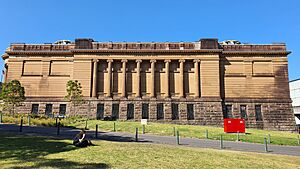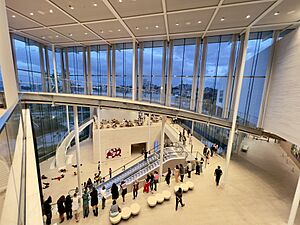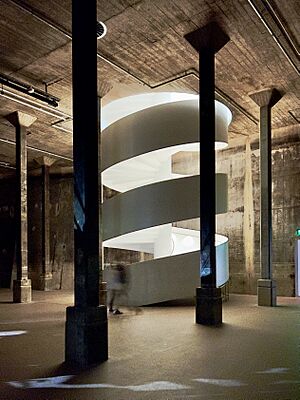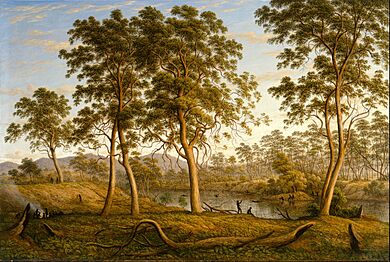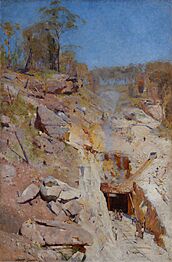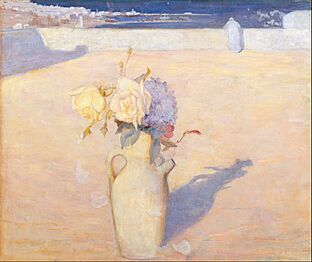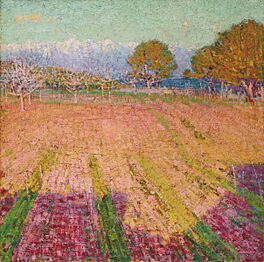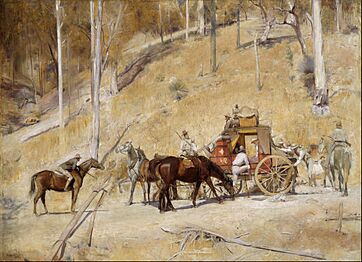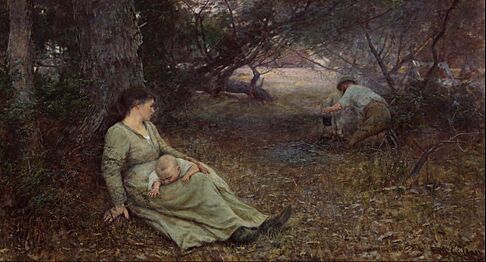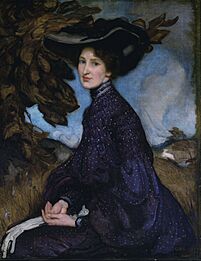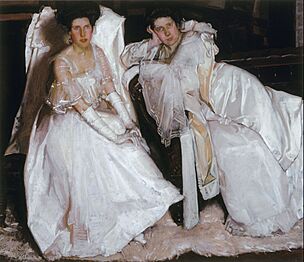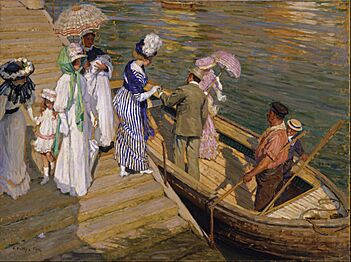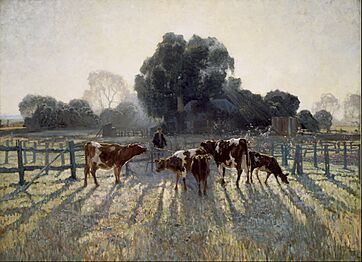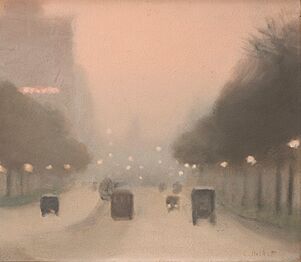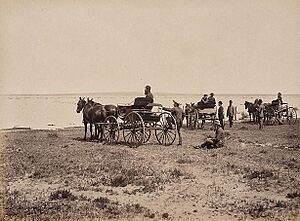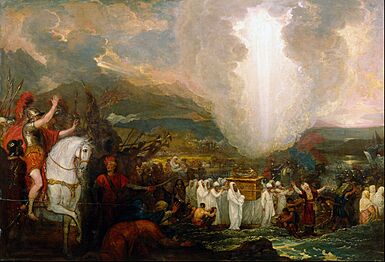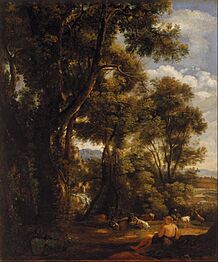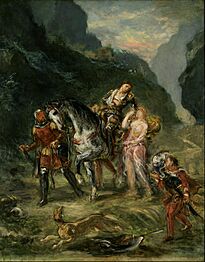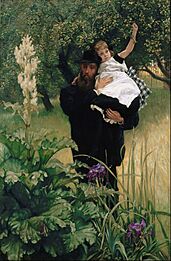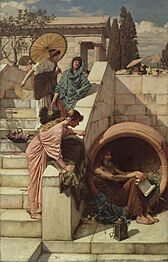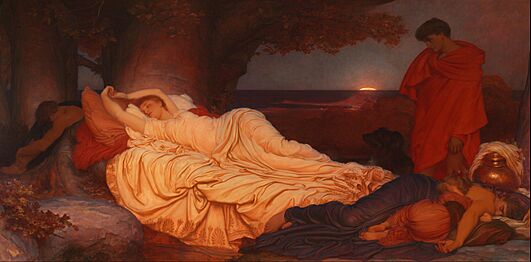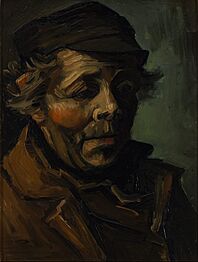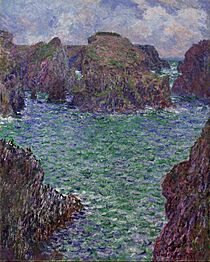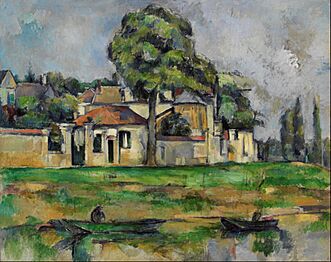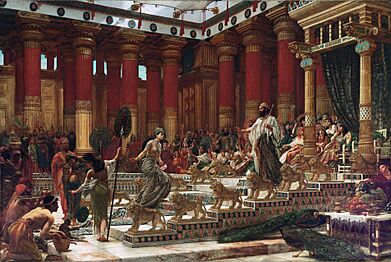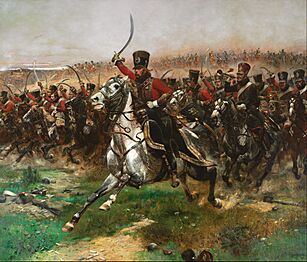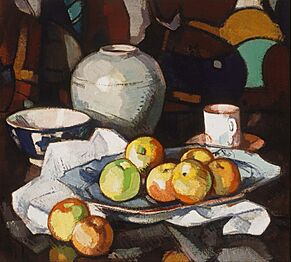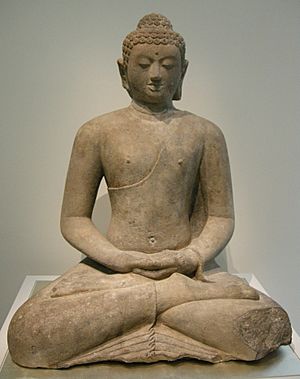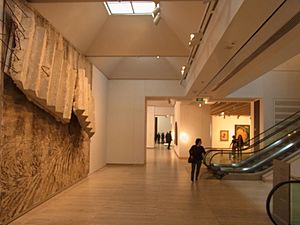Art Gallery of New South Wales facts for kids
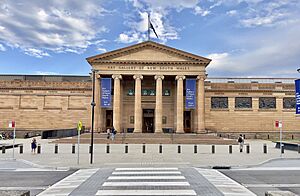
Facade of the Naala Nura building and entrance designed by Walter Vernon
|
|
| Established | 1874 |
|---|---|
| Location | Gadigal Country, Art Gallery Road, The Domain, Sydney, New South Wales, Australia |
| Type | Fine arts, visual arts, Asian arts |
| Visitors | 1,926,679 (2022–23) |
| Public transit access |
|
The Art Gallery of New South Wales (AGNSW) is a major art museum in The Domain, Sydney, Australia. It started as the New South Wales Academy of Art in 1872. Between 1883 and 1958, it was known as the National Art Gallery of New South Wales. Today, it is Sydney's most important public art gallery and one of the largest in Australia.
The gallery first opened its doors to the public in 1874. You can visit the main exhibition areas for free. These areas show Australian art, including amazing Indigenous Australian art, as well as art from Europe and Asia. A special gallery just for Asian art opened in 2003.
Contents
History of the Art Gallery
How the Gallery Started: 1800s
In 1871, a group of people in Sydney decided to create an Academy of Art. Their goal was to promote fine arts through classes, talks, and exhibitions. The New South Wales Academy of Art was officially founded in 1872. Its first exhibition of local art took place in 1874.
That same year, the government of New South Wales provided money for a new art gallery. A group of trustees, including Eliezer Levi Montefiore, was put in charge of these funds.
In 1875, the gallery bought its first artwork by an Australian artist: Apsley Falls by Conrad Martens. This painting cost £50, which came from the first government grant of £500.
The gallery's collection was first shown in a hall on Elizabeth Street. In 1879, it moved to a wooden building next to the Garden Palace in the Domain. It officially opened as the Art Gallery of New South Wales on September 22, 1880. In 1882, the gallery started opening on Sunday afternoons. Montefiore believed that everyone should have the chance to see art, especially since it was bought with public money.
Montefiore became the director of the gallery in 1892 and stayed in that role until he passed away in 1894.
When the Garden Palace burned down in 1882, the government needed to find a permanent home for the art collection. In 1883, the gallery changed its name to the National Art Gallery of New South Wales.
In 1895, Walter Liberty Vernon, the new government architect, was chosen to design the permanent gallery. Two art galleries opened in 1897, and two more in 1899. A watercolor gallery was added in 1901, and the Grand Oval Lobby was finished in 1902.
Growth and Changes: 1900s
(left side of facade)
Inscription: The Real and Lasting Victories Are those of Peace and Not of War.
(right side of facade)
Inscription: That our House may stand forever and that Justice and Mercy grow.
In 1906, over 300,000 people visited the gallery to see Holman Hunt's painting The Light of the World. In 1921, the first Archibald Prize was awarded for portrait painting. The large statues The Offerings of Peace and The Offerings of War were placed in front of the gallery in 1926.
In 1938, Nora Heysen became the first woman to win the Archibald Prize. That same year, electric lights were installed, allowing the gallery to stay open at night for the first time. In 1943, William Dobell won the Archibald Prize for his portrait of Joshua Smith, which caused a lot of discussion.
On July 1, 1958, the gallery's name officially changed back to the "Art Gallery of New South Wales."
In 1969, construction began on the Captain Cook wing to celebrate 200 years since James Cook landed in Australia. This new wing opened in May 1972.
The gallery held its first big exhibition, "Modern Masters: Monet to Matisse," in 1975, attracting 180,000 visitors. In 1976, the Biennale of Sydney, a large art festival, was held at the gallery for the first time. In 1978, Edmund Capon became the director.
A major expansion of the gallery was completed in December 1988, doubling its size. In 1994, the Yiribana Gallery opened, dedicated to Aboriginal and Torres Strait Islander art.
The Gallery in the 2000s
From 2000 to 2009, the gallery continued to grow. In 2003, an "Art After Hours" program started, keeping the gallery open later on Wednesdays. The first Australian Photographic Portrait Prize was also awarded.
In 2007, a 17th-century painting by Frans van Mieris was stolen from the gallery, leading to questions about security. In 2008, the gallery bought a painting by Paul Cézanne for A$16.2 million, which was the most it had ever paid for an artwork. The gallery also received a huge gift of over 260 contemporary artworks from the John Kaldor Family Collection.
From 2010 to today, the gallery has seen more changes. In 2010, new contemporary art spaces were created. The exhibition "The First Emperor: China's Entombed Warriors" in 2011 attracted over 305,000 people. Later that year, Edmund Capon retired after 33 years as director.
Michael Brand became the new director in 2012. The "Picasso: Masterpieces from the Musée National Picasso, Paris" exhibition attracted nearly 365,000 visitors, setting a new record for the gallery.
In 2013, the gallery announced plans for a big expansion called Sydney Modern. The goal was to double the size of the institution. The project involved building a new structure next to the existing 19th-century building. The design competition for this project was won by Tokyo architects Kazuyo Sejima and Ryue Nishizawa in 2015.
The new extension opened on December 2, 2022, almost doubling the gallery's exhibition space. This project cost $344 million. The new spaces focus on contemporary art and art by First Nations people. The new building also turned an old underground oil bunker into a unique gallery space called 'The Tank'. In April 2024, it was announced that the new north building would be called Naala Badu, meaning "seeing waters" in the Sydney language. The original south building is now called Naala Nura, meaning "seeing country."
In 2023, the gallery started Volume, an annual festival featuring live music and performances. In March 2025, Maud Page became the gallery's first woman director.
Gallery Buildings and Design
The Vernon Building
In 1883, architect John Horbury Hunt was asked to design a permanent gallery. His plans were not fully used, and only a temporary building, nicknamed the "Art Barn," was built.
In 1895, Walter Liberty Vernon, the government architect, took over the design. He created a classical-style building with eight courts lit by daylight. The first part of his building opened in 1897. By 1901, the entire southern half was finished. A newspaper at the time praised its "almost perfect" lighting and excellent background colors for art.
Vernon wanted a grand Central Court, but his plans were not fully accepted. The front of the gallery was finished in 1909, but no more of Vernon's designs were built after that. Plans to complete this part of the gallery in the 1930s were stopped due to financial problems.
Captain Cook Wing
In 1968, the government decided to complete the gallery as part of the Captain Cook Bicentenary celebrations. This new extension, designed by Andrew Andersons, opened in May 1972.
Andersons' design was modern and different from Vernon's classical style. He wanted to show a clear difference between the old and new parts of the building. For example, he used travertine flooring in the new galleries instead of the parquetry in the old ones. The new galleries were designed to be flexible for different art displays.
The Captain Cook Wing won an award for public architecture in 1975 and was recognized again in 2007 for its lasting design.
Bicentennial Extension
Sixteen years later, in 1988, another extension was built for the Australian Bicentenary. This part of the gallery was built on a sloping parkland, with much of it underground. It doubled the gallery's size, adding more space for art, a new Asian gallery, a theater, a café, and a rooftop sculpture garden.
Asian Art Gallery Expansion
A new space for Asian art was added in 2003, designed by Sydney architect Richard Johnson. This addition, sometimes called the 'light box' because it glows at night, expanded the Asian art galleries. It now holds art from all over Asia, including Buddhist and Hindu art, Indian sculptures, Chinese paintings, and Japanese works.
The extension added 720 square meters of space. In 2004, the design won awards for its unique look, described as "a floating white glass and steel cube."
Sydney Modern Project
The 'Sydney Modern' project, designed by Japanese architects Kazuyo Sejima and Ryue Nishizawa, opened on December 2, 2022. This large extension almost doubled the gallery's exhibition space to 16,000 square meters. The project cost $344 million.
The new spaces feature contemporary art and a special focus on First Nations artwork. They have large windows with views of Sydney Harbour. A unique part of the new gallery is 'The Tank', a former underground oil bunker that has been turned into a columned gallery space. The new north building is now called Naala Badu, and the original south building is called Naala Nura.
Art Collections
The Art Gallery of New South Wales has a wide range of art. In 1871, the collection began with European works. Later, it started buying art from Australian artists like Arthur Streeton and Tom Roberts.
The collection is divided into several main categories:
Aboriginal and Torres Strait Islander Art
The gallery did not have much Indigenous Australian art until the mid-1900s. In 1948, it received a gift of bark and paper paintings. In 1959, 17 grave posts from the Tiwi Islands were displayed, helping people see Aboriginal art as modern art. The first gallery dedicated to "Primitive Art" opened in 1973.
The Yiribana Gallery, which focuses on Aboriginal and Torres Strait Islander art, opened in 1994. This collection includes works from different Indigenous communities across Australia. It features early works from the late 1800s, desert paintings, bark paintings from coastal areas, and modern art by contemporary Indigenous artists.
Asian Art
The first Asian artworks joined the collection in 1879. These were ceramics and bronzes given by the Government of Japan. Since then, the Asian collection has grown to include art from South, Southeast, and East Asia.
Australian Art
This collection includes art from the early 1800s to today.
- 19th-century artists include John Glover, Arthur Streeton, Tom Roberts, and Frederick McCubbin.
- 20th-century artists include Arthur Boyd, William Dobell, Sidney Nolan, and Brett Whiteley.
Selected Australian Artworks
-
John Glover, Natives on the Ouse River, Van Diemen's Land, 1838
-
Tom Roberts, Bailed Up, 1895
-
Frederick McCubbin, On the Wallaby Track, 1896
-
George Washington Lambert, Thea Proctor, 1903
-
E. Phillips Fox, The Ferry, 1910
-
Clarice Beckett, Evening, St Kilda Road, 1930
Contemporary Art
The contemporary art collection includes international, Asian, and Australian art in many different forms. Thanks to a gift from the John Kaldor Family Collection, the gallery has one of Australia's best collections of contemporary art from the 1960s to today. It focuses on modern art movements like conceptual art and minimalism.
Pacific Art
The collection of art from the Pacific region began in 1962. Between 1968 and 1977, the gallery acquired over 500 works from the Moriarty Collection, which is one of the largest private collections of New Guinea Highlands art in the world.
Photography
The photography collection features many famous artists, including Tracey Moffatt and Bill Henson. It also includes early Australian photography from the 19th century and modern photo-documentary works. International photographs include European avant-garde art and American photo-documentary work.
Western Art
The gallery has a large collection of British Victorian art, with important works by Lord Frederic Leighton. It also has a smaller collection of European art from the 15th to 18th centuries, including works by Peter Paul Rubens and Canaletto. These older works are displayed alongside 19th-century pieces by artists like Vincent van Gogh, Claude Monet, and Paul Cézanne.
British art from the 20th century is also well represented, along with major European artists such as Pablo Picasso and Alberto Giacometti.
Selected Western Artworks
-
Benjamin West, Joshua passing the River Jordan with the Ark of the Covenant, 1800
-
John Constable, Landscape with goatherd and goats, 1823
-
Eugène Delacroix, Angelica and the wounded Medoro, 1860
-
James Tissot, The Widower, 1876
-
John William Waterhouse, Diogenes, 1882
-
Vincent van Gogh, Head of a Peasant, 1884
-
Claude Monet, Port-Goulphar, Belle-Île, 1887
-
Paul Cézanne, Banks of the Marne, 1888
-
Edward Poynter, The visit of the Queen of Sheba to King Solomon, 1890
Special Exhibitions and Prizes
The gallery hosts about 40 temporary exhibitions each year. Some of these have an entry fee. Besides these special shows, the gallery is home to famous Australian art prizes like the Archibald Prize, the Sulman, Wynne, and Dobell art prizes. The gallery also displays ARTEXPRESS, which showcases artworks by high school students from New South Wales.
The National Exhibition Series
The National is a series of art exhibitions that happen every two years. It features contemporary Australian artists and is a partnership between the Art Gallery of New South Wales, Carriageworks, and the Museum of Contemporary Art Australia (MCA). The first one was held in 2017.
The National 2021: New Australian Art was the third in the series. It showed new artworks from 39 artists and groups.
Brett Whiteley Studio
The Brett Whiteley Studio in Surry Hills was the home and workplace of Australian artist Brett Whiteley (1939–1992). Since 1995, the Art Gallery of NSW has managed it as a museum.
Gallery Programs and Services
The gallery offers many programs and services for visitors:
- Education: Resources for students of all ages, linked to the art collections and exhibitions.
- Volunteer Guides: Guides offer tours of the art and exhibitions to different groups, including school groups and gallery members.
- Conservation: Experts work to protect artworks from damage and decay, making sure they are safely displayed, stored, or moved.
- Public Programs: The gallery hosts talks, films, performances, workshops, and programs for people with special needs.
Gallery Facilities
The Art Gallery of New South Wales has several facilities for visitors:
- Café
- Restaurant
- Library and archive
- Study room
- Gallery Shop
- Centenary Auditorium (90 seats)
- Domain Theatre (339 seats)
Gallery Leadership
The Art Gallery of New South Wales is managed by a board of trustees. The gallery also supports other groups like the Art Gallery of NSW Foundation, which helps buy new artworks.
Gallery Directors
| Order | Director's Name | Role | Start Date | End Date | Time in Role |
|---|---|---|---|---|---|
| 1 | Eliezer Levi Montefiore | Director | September 1, 1892 | October 22, 1894 | 2 years, 1 month, 21 days |
| 2 | George Edward Layton | Secretary and Superintendent | January 1, 1895 | May 26, 1905 | 10 years, 4 months, 25 days |
| 3 | Gother Mann | Secretary and Superintendent (then Director and Secretary) | July 1, 1905 | January 2, 1929 | 23 years, 6 months, 1 day |
| 4 | James MacDonald | Director and Secretary | January 2, 1929 | November 13, 1936 | 7 years, 10 months, 11 days |
| – | William Herbert Ifould (acting) | Director and Secretary | November 13, 1936 | February 15, 1937 | 3 months, 2 days |
| 5 | Will Ashton | Director and Secretary | February 15, 1937 | April 28, 1944 | 7 years, 2 months, 13 days |
| – | Hector Pope Melville (acting) | Director and Secretary | April 28, 1944 | July 11, 1945 | 1 year, 2 months, 13 days |
| 6 | Hal Missingham | Director and Secretary | July 11, 1945 | September 3, 1971 | 26 years, 1 month, 23 days |
| 7 | Peter Laverty | Director | September 3, 1971 | December 30, 1977 | 6 years, 3 months, 27 days |
| – | Gil Docking (acting) | Director | December 30, 1977 | August 17, 1978 | 7 months, 18 days |
| 8 | Edmund Capon | Director | August 17, 1978 | December 23, 2011 | 33 years, 4 months, 6 days |
| – | Anne Flanagan (acting) | Director | December 23, 2011 | June 4, 2012 | 5 months, 12 days |
| 9 | Michael Brand | Director | June 4, 2012 | March 27, 2025 | 12 years, 9 months, 23 days |
| 10 | Maud Page | Director | March 28, 2025 | present | 3 months, 20 days |
Board Presidents
| # | President | Term | Time in Office |
|---|---|---|---|
| 1 | Sir Alfred Stephen | June 11, 1874 – January 30, 1889 | 14 years, 7 months, 19 days |
| 2 | Eliezer Levi Montefiore | March 20, 1889 – September 6, 1892 | 3 years, 5 months, 17 days |
| 3 | Frederick Eccleston Du Faur | September 6, 1892 – April 24, 1915 | 22 years, 7 months, 18 days |
| 4 | Sir James Reading Fairfax | May 28, 1915 – March 28, 1919 | 3 years, 10 months |
| 5 | Sir John Sulman | April 11, 1919 – August 18, 1934 | 15 years, 4 months, 7 days |
| 6 | Sir Philip Whistler Street | August 20, 1934 – September 11, 1938 | 4 years, 22 days |
| 7 | John Lane Mullins | September 23, 1938 – February 24, 1939 | 5 months, 1 day |
| 8 | Bertrand James Waterhouse | March 10, 1939 – July 23, 1958 | 19 years, 4 months, 13 days |
| 9 | William Herbert Ifould | July 23, 1958 – July 1, 1960 | 1 year, 11 months, 8 days |
| 10 | Eben Gowrie Waterhouse | July 1, 1960 – December 28, 1962 | 2 years, 5 months, 27 days |
| 11 | Sir Erik Langker | December 28, 1962 – June 7, 1974 | 11 years, 5 months, 10 days |
| 12 | Walter Bunning | June 7, 1974 – September 16, 1977 | 3 years, 3 months, 9 days |
| 13 | John Nagle | September 16, 1977 – July 11, 1980 | 2 years, 9 months, 25 days |
| 14 | Charles Benyon Lloyd Jones | July 11, 1980 – July 11, 1983 | 3 years |
| 15 | Michael Gleeson-White | July 11, 1983 – July 10, 1988 | 4 years, 11 months, 29 days |
| 16 | Frank Lowy | July 10, 1988 – December 31, 1996 | 8 years, 5 months, 21 days |
| 17 | David Gonski | January 1, 1997 – December 31, 2006 | 10 years |
| 18 | Steven Lowy | January 1, 2007 – December 31, 2013 | 7 years |
| 19 | Guido Belgiorno-Nettis | January 1, 2014 – December 31, 2015 | 2 years |
| – | David Gonski | January 1, 2016 – December 31, 2024 | 9 years |
| 20 | Michael Rose | January 1, 2025 – December 31, 2027 | 6 months, 16 days |
See also
 In Spanish: Galería de Arte de Nueva Gales del Sur para niños
In Spanish: Galería de Arte de Nueva Gales del Sur para niños


